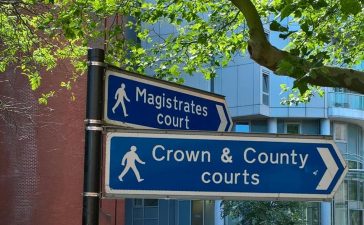The market town of Rhayader stands at a historic crossroads at the heart of Wales. Lorries trundle through, delivery vans dart around, tourists merrily motor along. The town sits on the A470, the main route between north and south Wales, and last year had 20mph signs posted on its four main approaches.
Six months later and before the possible reversal of the nationwide default speed limit policy, people still have mixed feelings.
“I’m all for it,” said Thomas Lewis Jones, who runs a hardware store on East Street. “It makes town centres infinitely safer. I have a seven-year-old son learning to ride a bike. Of course you want people going slower. It only takes seconds longer to go through the town at 20 rather than 30.”
The Labour-led Welsh government announced this week that hundreds of roads that were changed to 20mph could be returned to 30mph during a major review after almost half a million people signed a petition calling for the policy to be scrapped.
As well as champions, there are many opponents in Rhayader. “It’s crap,” said Gwyn Evans, an 80-year-old retired electrical engineer. “They’ve spent millions on it. That’s money that should be spent on the NHS or schools.”
Father and son David and Tom Jones, who work at the 100-year-old family-run ET James petrol station and garage, said most of their customers hated it. “The problem is, the speed limit changes every few miles and it’s not slowing people down,” said Tom.
Rhys Thomas, the mayor of Rhayader – which bills itself as the outdoors capital of Wales – said: “It was evident that a 20mph suits-all option was not the correct one.
“In areas such as heavy pedestrian zones, schools and gathering places … it is the right to have 20mph limits but we welcome the decision to re-look at all areas.”
This is the position taken by the AA. Jack Cousens, head of roads policy, said 20mph tends to works best on streets with community assets such as schools, surgeries and local shops. “The concern held by some is that a wider, far-reaching zone dilutes its effect on reducing speed in the area it is trying to protect,” he said.
The question now is whether Wales’s move signals that the UK has reached peak 20mph, and if the policy could be reversed elsewhere.
This is arguably most pressing in Scotland, where the government is working to implement 20mph by 2025. A Transport Scotland spokesperson affirmed it is “committed” to doing so, and that Wales’s decision would not influence its timetable.
Joanne Leach, a researcher at the University of Birmingham, said that although other places are unlikely to replicate Wales’s approach, there will continue to be a broader push to reduce reliance on cars. “My sense is that we aren’t going to be speeding up, generally speaking. All of the indicators coming through is it’s about managing vehicles, either slowing them down or removing them entirely from the road.”
She expected that other areas would learn lessons from Wales’s experience, and adopt a bespoke, place-based approach in smaller geographical areas, done in consultation with the local community, rather than a blanket country-wide policy.
Evidence on the impact of 20mph zones is conflicting. “It’s not terribly conclusive, it depends where you did your study and when,” said Leach. “It hasn’t been in long enough in Wales to do a proper assessment of whether it has a significant impact.”
Around schools or areas with lots of parked cars and people crossing roads, there is a “definite and clear benefit”, Leach said. In other areas, it can increase accidents because slower speeds can lead to greater driver distraction, she said.
Research suggests that since 20mph limits were implemented in Edinburgh, the number of collisions in one year fell by 40%, including 23% fewer deaths and 33% fewer serious injuries.
In Belfast, the introduction of 20mph made no difference, although the research was done on a very small section of roads.
Rebecca Guy, senior policy manager at the Royal Society for the Prevention of Accidents (Rospa), said that, depending on their age, victims are seven times more likely to survive road accidents at 20mph compared with 30mph.
after newsletter promotion
“Almost 30,000 people were killed or seriously injured on the UK’s roads in 2022, and statistics show that government has taken its foot off the gas when it comes to road safety, leaving us with a decade of minimal progress,” she said, noting that England is the only UK nation without a road safety strategy.
There are also environmental reasons for 20mph, which can improve air quality by reducing particulate levels, according to Imperial College research.
Yet in some areas it can elevate pollution; driving at 20mph down a steep hill means that drivers must brake the whole way down, while some buses and older vehicles run less efficiently at 20mph.
There has been local grassroots opposition, including online petitions garnering thousands of signatories, to 20mph in various places, but there is no big campaign to reverse 20mph outside Wales, said Robert Bull, chair of the Alliance of British Drivers.
Bull is based in Bristol, a city with lots of 20mph zones, where he said motorists had initially been unhappy with the policy’s introduction. “They’ve not made peace with it, but they’ve accepted it because what can you do? It’s difficult to change when it’s done.”
He said a perception remained among motorists that 20mph is ideological and not-evidence based. “It’s money wasted that could have been better spent on other road safety activities.”
Charles Musselwhite, a professor at Aberystwyth University, said evidence suggests that people get used to 20mph speed limits over time. This is because transport interventions typically follow a “hype cycle”: a proposed idea garners growing support, which falls as the detail emerges, then returns after implementation.
Welsh government-commissioned research suggests 80% were in favour of 20mph limits in 2021, although this fell to 63% in 2022. A YouGov poll of UK adults in 2022 showed more in favour than against 20mph in urban areas (48% v 39%).
Musselwhite said: “What we see in Wales is that most people are not opposed to 20mph speed limits at all, but a loud, vocal minority are, and we expect support to grow as people realise the benefits.
“But it needs a government willing to stand its ground in the face of negative opinion just after implementation, as we are seeing now.”











